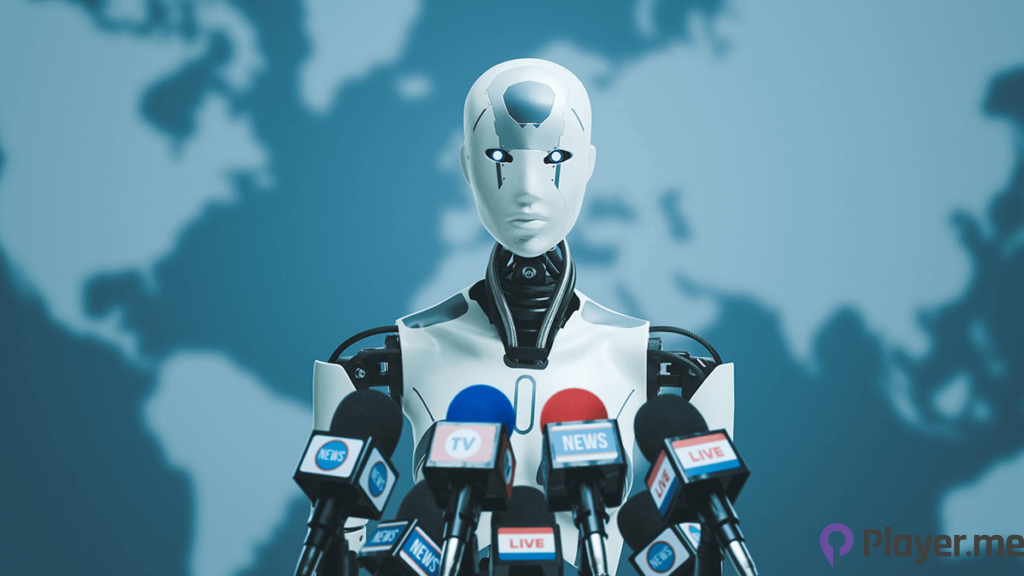
The rise of AI-based technologies has met with as much controversy as excitement. Individuals and organisations are rightly excited about predictive technologies’ potential and capacity to optimise work productivity. However, on the other hand, there are serious concerns about what the wrong people can do with it. As a result, the place of AI in the dissemination of information, in particular, has come under great scrutiny.
The AI Controversy

AI is a technology that is based on human cognitive ability. It attempts to replicate humans’ cognitive behaviour by interpreting vast amounts of real-world data. Many AI-based tools used in facial recognition and text generation work this way. The data is analysed for patterns, forming the basis for algorithms. These algorithms are subsequently utilised as AI-based predictions in various forms. With such profound predictive and generative capacity, AI is bound to draw controversy. For instance, there are concerns that extremists could use text generators to create and propagate hate speech. This makes AI of great interest and significance to matters of national importance.
Related: AI Boyfriend: Your Ultimate Convenient Companion in 2023
AI in Politics

AI has recently entered the political scene and is increasingly looking controversial for voters and candidates firmly against misinformation. Indeed, the primary fear of using AI in politics is the ease at which generative technologies can spread propaganda. As recently as January, a fake video of President Biden made the rounds on Twitter. The video appeared to show an announcement of a draft to send Americans to fight in Ukraine. Although the original clip displayed a caption stating that it was AI-generated, the disclaimer quickly lost in circulation. This is an example of how AI can be used to misinform, even inadvertently.
Read More: Using Generative AI to Resurrect the Dead Will Create a Burden for the Living
The Dangers of Political Propaganda
Although political propaganda is not new, its ease of creation makes AI so controversial. Generative and predictive technologies will likely be effectively used against vulnerable populations like people of colour and women. In places like India, AI has been weaponised against female journalists and politicians. These victims had their photos placed onto pornographic videos and images and circulated online, further showing the dangers of AI. As such, AI-generated images in political advertisements can easily be manipulated to various extents. These realities have recently prompted some tech giants like Facebook and Google to take mitigating steps.
Google Steps Forward

Google recently revealed that it will begin to mandate the disclosure of AI use in political ads starting in November. This is a significant step ahead of the 2024 US General Elections and will curb misinformation in tenuous times. The move comes as political campaigning reaches a fever pitch and increasingly adopts AI in advertising.
Conclusion
It should be noted that Google has not banned ads that use AI or synthetic content. Instead, it has only mandated that verified election advertisers disclose the use of generative or predictive technology in their ads. The company has yet to publicly detail any penalties for advertisers who fail to follow its latest guidelines. The new policy will further help support responsible political advertising. Furthermore, it will provide voters with the correct information required to make informed decisions.
Frequently Asked Questions
How Has the U.S. Government Responded to the Trend of AI-Generated Political Ads?
Representative Yvette Clark of New York recently introduced the “REAL Political Advertisements Act”. The act required disclosures for the use of AI-generated content in political advertisements. Also, the Biden administration recently released an action plan for promoting responsible AI innovation. Furthermore, the Senate Judiciary Privacy, Technology, and the Law Subcommittee recently held a hearing on potential oversight of AI technology.
Why Has Google Updated Its Rules Regarding AI-Generated Political Ads?
Although fake images, audio clips and images aren’t novel to political advertising, AI tools are making them easier to do and more realistic. Some presidential hopefuls for the 2024 race, such as Governor Ron DeSantis, are already using the technology. Given the potential of such ads for misinformation and spreading dangerous information, Google has had to take severe steps. The new rule takes effect in mid-November and will affect campaign ads ahead of elections in South Africa, India and the European Union.
What Has Been the Response to Google’s Updated Policy Regarding the Use of AI in Campaign Ads?
Google’s recent announcement has been met with mixed opinions among individuals in the corporate world. Christopher Alexander, the Chief Analytics Officer of Pioneer Development Group, is sceptical of the new policy, stating that it ultimately accomplishes nothing. He goes on to add that the move only stifles innovation in AI. Jonathan D. Askonas, an assistant professor of politics, has also questioned the effectiveness of the rules. On the other hand, Phil Siegel, the Center for Advanced Preparedness and Threat Response Simulation’s founder, praises the rule’s intent but questions its implementation.
Author Profile
Latest entries
 GAMING2024.06.12Top 4 Female Tekken 8 Fighters to Obliterate Your Opponents in Style!
GAMING2024.06.12Top 4 Female Tekken 8 Fighters to Obliterate Your Opponents in Style! NEWS2024.03.18Elon Musk’s SpaceX Ventures into National Security to Empower Spy Satellite Network for U.S.
NEWS2024.03.18Elon Musk’s SpaceX Ventures into National Security to Empower Spy Satellite Network for U.S. GAMING2024.03.17PS Plus: 7 New Games for March and Beyond
GAMING2024.03.17PS Plus: 7 New Games for March and Beyond GAMING2024.03.17Last Epoch Necromancer Builds: All You Need To Know About It
GAMING2024.03.17Last Epoch Necromancer Builds: All You Need To Know About It





